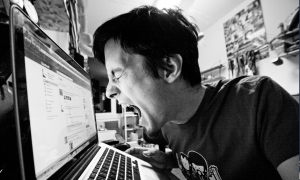Q: Do you think the week was a success?
A: Yes, a job well done. It worked! Students became aware of being stressed out about checking their status continually. They weren't even aware that they were stressed. They had been losing sleep over feeling the need to stay connected, thinking, "I'm a college student; that's what we're supposed to do." Turns out, it wasn't the schoolwork [causing the stress], it was the addiction to staying connected. Many students said they were better able to concentrate on getting their work done and that they could sit around the university and not feel overwhelmed.
If I had asked our students, faculty, and staff before all of this if they thought social media was a huge part of their lives and work, the answer would have been no. But now, many are seeing that it is a really big part of how we behave and what we do.
Q: What kind of results are you seeing?
A: We're doing surveys, leading focus groups, and asking the students to write reflective essays about this, so next week, we’ll see what the more quantitative aspects say. We'll be asking groups of students to comment on their experiences and really focus on lessons learned. Are they going to rethink how they use Facebook? I've heard some students say, "I'm going to use it less." That was never the intent. The hypothesis [to this week's ban] wasn't that social media is good or bad. It could be be both. It just depends on how it's used.
Several of our students talked about using these applications for school and business purposes, for instance. They also use them for their social aspects. What they realized was that in the flurry of all the things that flow through Facebook in a day, they were losing focus and missing messages related to school or business-oriented things. They probably needed to restructure the way they used Facebook. Beyond turning it on or off, how do you best structure it for what you want to do with it?
Anecdotally, I know several students here spend 21 hours a day actively using Facebook. They literally have to put up a message that says, "Now I’m going to sleep." That’s pretty phenomenal.
Q: Would you recommend a temporary ban like this to other universities or K-12 schools?
A: Yes, I really would recommend it. Social media adds a tremendous amount of value to the university and to the students; suggesting a permanent ban was not at all what I intended. But do I think that a temporary ban of one or more of these sites in a planned way is a good experiment for people to learn from? Yes, I do. Don't implement a ban for a ban's sake, but if you intend to focus on something or to learn something, then it's a great way to do it.
Q: Would you do a similar experiment again at Harrisburg University?
Absolutely. Whether it will become a university tradition, I don’t know. But we're already planning something either for the spring or next fall or both. Part of the activities last week included a social media summit, with twenty experts from the mid-Atlantic region, and 200 others from government, marketing agencies, and businesses. We talked about a certain set of topics: social media and business innovation, social media for political change, social media in higher education. We'd probably cover a different set of topics in the future based on what we learned from this set of experiences. But we'll see. We could use the same set of questions [in future surveys], like, "Here's the way people thought about social media in 2010." And then we could explore how things have changed and progressed, or regressed, as the case may be.


